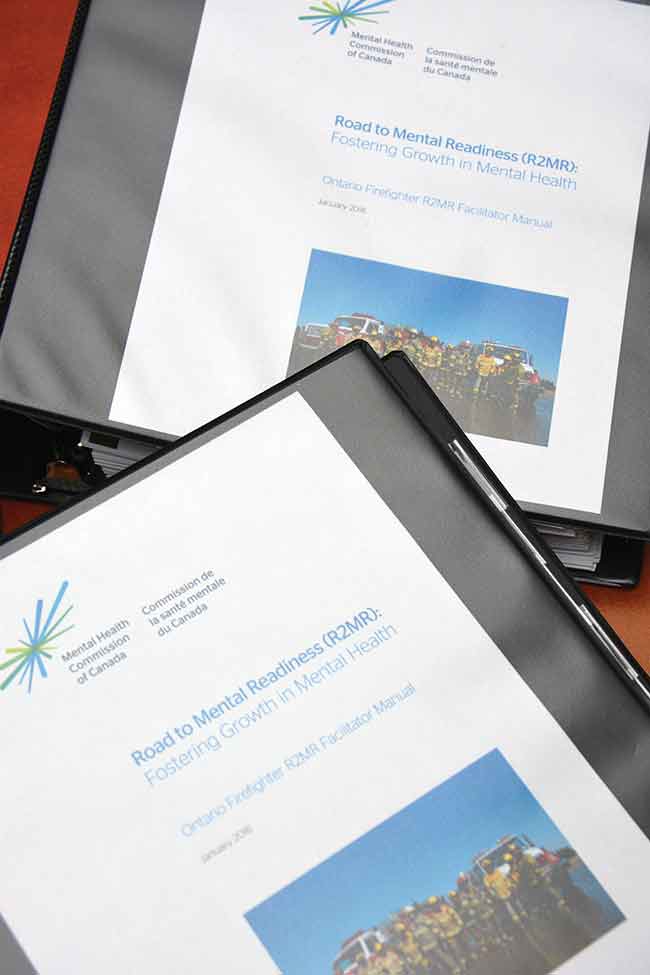
Dispatches – April 2016
Jennifer Grigg
Features Health and Wellness WellnessIn early February I took the Road to Mental Readiness (R2MR) train-the-trainer course in Mississauga, Ont., and it changed me, challenged me, and at the same time gave me hope. My own experiences with mental-health issues were precisely what attracted me to the course, and I was glad to have been chosen as one of the first 40 fire-service members in Ontario to be accepted into the program.
 We have to look out for our fire-service brothers and sisters Ontario firefighter Jennifer Grigg took the Road to Mental Readiness (R2MR) train-the-trainer course and writes that it changed her
We have to look out for our fire-service brothers and sisters Ontario firefighter Jennifer Grigg took the Road to Mental Readiness (R2MR) train-the-trainer course and writes that it changed herR2MR was originally developed for the Department of National Defence, and then modified for the police service by the Mental Health Commission of Canada and the Calgary Police Service. The program was subsequently modified and adapted by the Calgary and Cornwall fire departments, and brought to the Ontario fire service by the Ontario Association of Fire Chiefs.
R2MR provides practical knowledge and skills to address mental health and mental illness in firefighting organizations; in other words, to save our brothers and sisters.
As of March 3, at least one firefighter, six paramedics and four police officers had killed themselves in Canada this year. And those are just the ones we know about. Three deaths occurred within a five-day period, according to Global News.
We talked extensively in the course about the stigma surrounding mental illness. Regardless of whether it is depression, anxiety, substance abuse, post-traumatic stress disorder, or any other mental illness, our fear of ridicule makes us afraid to come forward.
We ask ourselves: what will people think? Will they think I’m weak? Does it mean I’m damaged goods? (A favourite label I have used on myself for years.) Is it a life sentence?
We in emergency services are quite comfortable in our role of responding to the needs of others, but asking for help is an entirely different situation. Not only is it difficult to reach out for assistance, we are not always aware when we are experiencing mental-health issues.
We may feel that whatever symptoms we are experiencing will go away, or we convince ourselves that we have got a handle on whatever we are feeling and keep on keeping on. We tell ourselves that we are just having a bad day. Before we know it, the bad days are outnumbering the good and most, if not all, areas of our lives suffer. Mental health, physical health, performance at work, relationships with friends and family and passion for life, all suffer the consequences of mental illness.
That’s where the mental health continuum model comes into play. The model is a colour-coded chart that determines a person’s mental health status within four categories: green (healthy), yellow (reactive), orange (injured) and red (ill). The chart allows individuals to identify indicators of declining or poor mental health in themselves and others, and also teaches the appropriate actions to take at each point along the continuum.
The continuum model makes getting help easier, to say the least, by laying out benchmarks for symptoms according to where a person falls in the continuum, and also providing everyone with one word for help. This one word, when spoken, speaks volumes. Even if all a person can do is mutter “orange” or “red”, we all understand. We know what we need to do.
Raising awareness about mental-health issues in the fire service (and all emergency services – police, EMS, communications, corrections and so on), reducing the stigma surrounding mental illness and educating firefighters in Ontario as well as Alberta through the R2MR program are the new three lines of defence. (The original three lines of defence are public fire-safety education, fire-safety standards and enforcement, and emergency response.)
We have to look out for our fire-service brothers and sisters, just as we do our family members. Take the time to talk to the guys and gals in your hall. Check in with them after a tough call and see how they are doing. It doesn’t have to be a long talk (unless that’s what they need, in which case definitely give them your full attention). Ask them how their spouses and children are doing, suggest going for a coffee after a call, or meet them for breakfast on the weekends.
Encourage respect and cohesiveness in the fire hall and create a positive environment. Let your colleagues know you are there for them, regardless of your rank. Be generous with the “good job” or the “way to go” after a call; it doesn’t matter whether it was a simple medical or an exhausting structure fire. We are all leaving our families, our homes and our jobs and putting our lives on hold to go out and help others, and we need to reinforce acknowledgement and appreciation, and the idea that we are all part of a team.
Jennifer Grigg has been a volunteer with the Township of Georgian Bay Fire Department in Ontario since 1997. jhook0312@yahoo.ca or twitte@georgianbayjen
Print this page